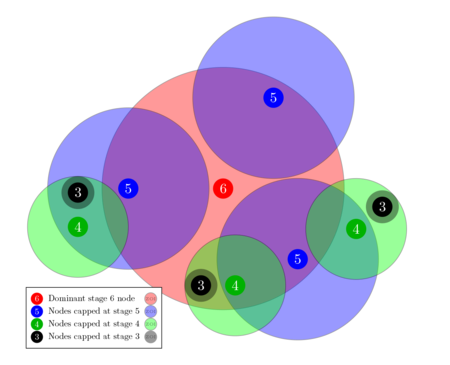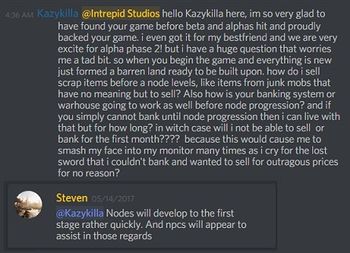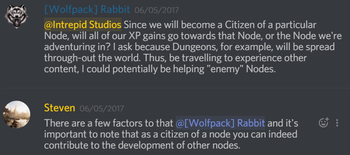„Freehold destructibility” változatai közötti eltérés
Lex (vitalap | szerkesztései) a |
Lex (vitalap | szerkesztései) a |
||
| 9. sor: | 9. sor: | ||
== See also == | == See also == | ||
| + | * [[Freeholds]] | ||
* [[Static housing destructibility]] | * [[Static housing destructibility]] | ||
* [[Apartment destructibility]] | * [[Apartment destructibility]] | ||
A lap 2019. június 12., 22:02-kori változata
Freeholds may be attacked by any player for a period of two hours following a successful siege against its parent node.[1][2][3][4] Freeholds can also be lost by foreclosure for not paying property taxes or other fees.[5]
- Players and their allies may defend their freehold for this period of time.[4]
- Structures and guards may be obtained to defend freeholds during this period.[4]
- When it comes to losing Freeholds like this, one person’s loss is another person’s gain. While there aren’t enough Freeholds in the world for everyone to have one at the same time, this cycle of players losing Freeholds creates opportunities for other players to acquire one.[5]
After the two hour period of open combat following a successful node siege, any remaining freeholds will exist under a grace period for roughly 1 week where another node may take over the zone of influence of the freehold.[2][3]
- The freehold owner will be required to undertake a quest process to have their freehold adopted by a new node if one exists.[2]
- At the end of the grace period, if the freehold does not reside within the ZOI of a Village (színpad 3) node or above, it will be destroyed.[5][3][2][6]
- If a siege is successful, then the Node is brought down to Level 0, and anyone who was a citizen of that Node is no longer a citizen. Freeholds within the Zone of Influence are subject to a period of vulnerability. These Freeholds can be destroyed by other players during a period of roughly 2 hours after a successful siege. Destroyed Freeholds are subject to material loss, and blueprints for them are mailed to the player to utilize for future placement in order to allow the player to keep their Freehold’s layout and structure. Once the vulnerability period is complete, any remaining Freeholds will exist under a grace period for roughly 1 week where another Node may take over the Zone of Influence of the Freehold.[3] – Margaret Krohn
- Q: How many times a year do you suspect that most players will be moving residence based on nodes being eliminated from sieges?
- A: There are a lot of variables that influence that answer. I'm not sure I can give an average, but what I would say is that depending on the political dynamic of a server: if a server tends to have more combat and/or sieges against nodes, that is going to increase the amount of opportunity for freeholds to be removed from the world and then replaced. I'm not sure I have an average. what I will say is that it is very important to remember that Ashes is not a PvP game and it is not a PvE game. It is a PvX game and that has a very specific meaning. It means that as these systems are developed as they are designed and they are integrated with each other: they are done so from a competitive viewpoint and how that system relates to both PvE and PvP. Freeholds are one of those systems very much so and it's because of the cyclical nature that we're attempting to achieve with the development of nodes and the destruction of nodes, the world is a rapidly and dynamically changing place really. So it's intended to be something that is constantly recycling and is leaking out different types of content and new content that revitalizes the player interest and stimulates new points of conflict or cooperation.[8] – Steven Sharif
Player housing designs and decorations are retained and can be placed again later if the housing is destroyed during a node siege.[5][9][10]
- Blueprints for homestead, business, and artisan freehold buildings, including progression and upgrades, are returned to the player.[5][3][9][10]
- A possible design idea is for items such as furnishings to be boxed in crates that are accessible inside the new home.[11]
Node's zone of influence
Nodes advance by collecting experience from the actions of players nearby. As players complete content inside of a Node’s Zone of Influence (the area around the node), they contribute that experience toward the Node’s development. The experience given to the Node may then be modified based on certain Events and Accomplishments. When a Node reaches the experience required, it undergoes the process of advancing to the next stage. There are a few exceptions where a Node cannot advance even though it has the required experience - most commonly, a Node can not advance if a Node is a Vassal of another Node and would advance to the same stage as its Parent Node.[3] – Margaret Krohn
A lakosok, és nem lakosok aktivitása (küldetések, gyűjtögetés, Raid-elés, stb.) a Node ZOI-ján belül annak a Node-nak a fejlesztését gyarapítja (fejlődés).[12] A Node-ok hét (7) fejlődési fázissal rendelkeznek, melyek mindegyikéhez hozzá van rendelve egy elérendő tapasztalatküszöb, a fejlesztéshez.[13]
| Node fázis.[12] | Alternatív név.[14] | Fejlesztéshez szükséges idő.[12] | Játékos lakások.[15] | |
|---|---|---|---|---|
| 0. | Vadon | - | ||
| 1. | Expedíció | Kereszteződés | Pár óra | - |
| 2. | Táborhely | Tábor | Órák | - |
| 3. | Falu | - | Pár nap | Kis házak |
| 4. | Kis város | - | Napok | Közepes házak |
| 5. | Város | - | Pár hét | Nagy házak |
| 6. | Metropolisz | Nagyváros | Hetek | Kastélyok |
The Development Area of a Node is where civilization will appear as the Node advances. As the Node Stage increases, different buildings, NPCs, and services will become available in the Development Area. The higher the Node Stage, the more complex and populated the Development Area becomes. Development Areas will also vary depending on the Node Type - Economic, Military, Scientific, or Divine; we’ll go into further details on each of those Node Types in future posts in this series.[3] – Margaret Krohn

Beginning at Node Stage 3, when a Node advances, it enslaves nearby Nodes and makes them into its Vassals. Vassal Nodes are owned by a Parent Node and must always be at least one Node Stage below the Parent Node. This means that the Vassal Node cannot grow until the Parent Node advances in stage. Vassal Nodes give excess experience to their Parent Node, and are able to have their own Vassals, as long as they fit within the Parent Node’s Zone of Influence. They are subject to the government, alliances, wars, taxes, and trade of their Parent Node, and are able to receive federal aid from them. A Vassal Node cannot declare war on their Parent Node or any of its Vassals. Citizens of Vassals are bound by the diplomatic states of the Parent Node.[13] – Margaret Krohn
Egy Node fejlesztése elérhetővé teszi az egyedi tartalmát, amivel egyidejűleg egyre nagyobb körzetben akadályozza meg a szomszédos Node-ok fejlődését.[17]
- A Node-ok gyorsan érik el az első szintet. Ez elérhetővé teszi az NPC szolgáltatásokat, mint a bolt, vagy tárgyak eltárolása.[18]
- Minél fejlettebb egy Node, annál nagyobb a hozzá tartozó ZOI.[19]
- Kevésbé fejlett Node-ok (avagy vazallus Node-ok) amik fejlettebb Node ZOI-ján belül vannak, szerezhetnek további tapasztalatot, de nem fejlődhetnek a domináns Node szintjére.[16]
- A vazallus rendszer akkor lép életbe, ha egy Node eléri a 3.fázist (Falu), de a szomszédos, hármasnál kisebb Node-ok is megakadályozzák a közvetlen szomszédaik fejlődését.[20]
- A terület kiterjesztő algoritmus figyelembe veszi a legközelebbi tengerpartot, a szomszédos Node-okat és a környezetében lévő területek játékos-sűrűségét az elmúlt hetekben.[21]
- Azon okból, ahogy a kiterjeszkedést számító algoritmus kiszámolja egy növekedő Node ZOI-ját, előfordulhat, hogy két azonos szintű Node egymáshoz közel esik.[22]
The way that the algorithm expands the territories takes into account a few things: One it takes into account the coast like where's the closest coast. Two it takes into account the neighboring nodes so it can take over and essentially vassal state those nodes, but what's more important is essentially the initial population based on like how players choose their races. Because we have nine different races and four different starting points that branch out, each server's population density is going to dictate essentially the first few nodes that are that are highly populated and then that initial seed is what's going to determine the node structure as it moves inland into the into the world essentially; and based on the performance and successes of different sieges will determine which nodes that got locked out from the previous the initial advancements what nodes can now be available to advance further. So I really think that with so many variables that are present in the equation of how nodes advance and stay existing with the more variables you have, the higher likelihood there is for there to be a significant diversion in world progression.[21] – Steven Sharif
Normally the algorithm that's applied to the node territorial expansion will prevent significant nodes from being in close proximity to each other... There could be a perfect storm where all of the algorithmic progression of territory leads to having these nodes very close to each other because there's certain requirements that should that need to be available to satisfy node vassal takeovers; and it's possible that two nodes would never take each other over as vassals and end up close together and spanning their territories in opposite directions: The Tale of Two Cities thing.[22] – Steven Sharif
- A domináns Node nem kap tapasztalatot a vazallus Node-ok területén szerzet tapasztalatból, amíg azok el nem érik a számukra elérhető legnagyobb szintet.[16]
- A játékosok mozgatva(elteleportálva) lesznek, ha a fejlődés közben egy megjelenni készülő épület útjában vannak.[23]
- Egy Node lakosai gyarapíthatják egy eltérő Node fejlesztését.[24]
- A fejlődés konkrét tapasztalat követelménye (pl. hány szörnyet kell megölni) nem lesz nyilvánosan tudott, a rendszer kihasználását elkerülendő.[25]
Different people have different resources invested in nodes progressing and it would be a little "gamey" if you could know exactly what was necessary at that point because that would disincentivize people from participating.[25] – Steven Sharif
Továbbiak
Hivatkozások
- ↑ Élő adás, 2021-11-19 (54:26).
- ↑ 2.0 2.1 2.2 2.3 Élő adás, 2020-08-28 (2:04:00).
- ↑ 3.0 3.1 3.2 3.3 3.4 3.5 3.6 3.7 Blog - Know Your Nodes - Advance and Destroy.
- ↑ 4.0 4.1 4.2 Élő adás, 2017-05-19 (28:04).
- ↑ 5.0 5.1 5.2 5.3 5.4 5.5 Blog: Exploring the Boundless Opportunities of Freeholds.
- ↑ Élő adás, 2017-05-19 (29:34).
- ↑ Élő adás, 2023-07-28 (1:26:16).
- ↑ Élő adás, 2023-06-30 (1:39:22).
- ↑ 9.0 9.1 Élő adás, 2017-07-18 (40:14).
- ↑ 10.0 10.1 Élő adás, 2017-11-17 (47:10).
- ↑ Élő adás, 2020-06-26 (1:00:57).
- ↑ 12.0 12.1 12.2 A reactive world - Nodes.
- ↑ 13.0 13.1 Blog - Know Your Nodes - The Basics.
- ↑ Élő adás, 2018-12-12 (14:48).
- ↑ Interjú, 2020-07-20 (3:45).
- ↑ 16.0 16.1 16.2 Élő adás, 2017-10-16 (50:20).
- ↑ Video, 2017-04-20 (0:02).
- ↑

- ↑ Node series part II – the Metropolis.
- ↑

- ↑ 21.0 21.1 Interjú, 2020-07-18 (10:04).
- ↑ 22.0 22.1 Interjú, 2020-07-08 (1:00:15).
- ↑ Élő adás, 2017-11-17 (55:27).
- ↑

- ↑ 25.0 25.1 Élő adás, 2017-05-26 (28:16).